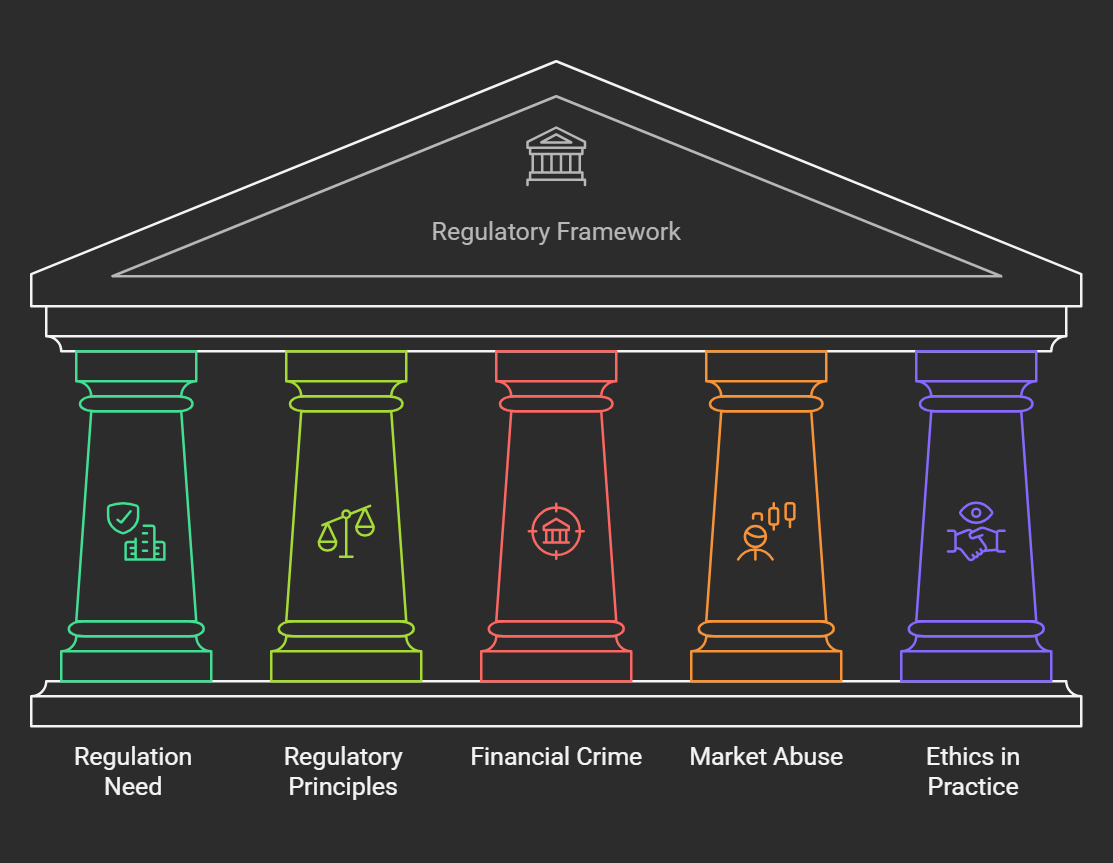Skip to main content
Regulation and Ethics
Regulatory Principles, Financial Crime, Ethics: Course Notes

1. Need for Regulation
-
Protect Investors: Ensure fair markets and prevent fraud.
-
Maintain Market Integrity: Promote transparency and prevent market manipulation.
-
Promote Financial Stability: Prevent systemic risk and protect the overall economy.
-
Build Public Confidence: Encourage participation in financial markets.
-
Address Information Asymmetry: Level the playing field between financial institutions and individuals.
2. Regulatory Principles
-
Transparency: Clear disclosure of information about products, fees, and risks.
-
Accountability: Holding individuals and firms responsible for their actions.
-
Proportionality: Regulations should be appropriate for the size and complexity of the firm.
-
Consistency: Applying regulations fairly and consistently across the market.
-
Effectiveness: Regulations should achieve their intended objectives.
-
Efficiency: Minimizing the cost and burden of regulation.
-
Risk-Based Approach: Focusing regulatory efforts on areas with the highest risk.
-
International Cooperation: Collaborating with other countries to address cross-border issues.
3. Financial Crime
-
Definition: Illegal acts involving money or financial assets.
-
Types of Financial Crime:
-
Money Laundering: Concealing the origins of illegally obtained money.
-
Fraud: Deceiving others for financial gain (e.g., investment fraud, insurance fraud).
-
Bribery and Corruption: Offering or accepting payments to influence decisions.
-
Terrorist Financing: Providing financial support to terrorist organizations.
-
Cybercrime: Using computers and networks to commit financial crimes (e.g., phishing, hacking).
-
Impact:
- Erodes public trust in financial institutions.
- Damages the economy.
- Supports criminal activities.
4. Insider Trading and Market Abuse
-
Insider Trading: Trading on confidential information that is not available to the public.
-
Illegal: Unfair advantage over other investors.
-
Market Abuse: Any behavior that distorts or manipulates the market.
-
Includes:
-
Spreading false rumors.
-
Manipulating prices.
-
Concealing ownership.
-
Examples of Market Abuse:
-
Pump and Dump: Artificially inflating the price of a stock and then selling it for a profit.
-
Wash Trading: Buying and selling the same security to create the illusion of activity.
-
Consequences:
-
Criminal Penalties: Fines, imprisonment.
-
Civil Penalties: Fines, disgorgement of profits.
-
Reputational Damage: Loss of trust and business.
5. Integrity and Ethics in Professional Practice
-
Importance:
- Building trust with clients.
- Maintaining the reputation of the profession.
- Ensuring fair and ethical practices.
-
Key Ethical Principles:
-
Integrity: Honesty, trustworthiness, and moral soundness.
-
Objectivity: Impartiality and unbiased decision-making.
-
Competence: Maintaining the necessary skills and knowledge to provide competent service.
-
Fairness: Treating all clients equitably and without discrimination.
-
Confidentiality: Protecting client's private information.
-
Professionalism: Maintaining a high standard of conduct and representing the profession in a positive light.
-
Code of Ethics:
- Formal set of rules and guidelines for ethical conduct.
-
Ethical Dilemmas:
- Situations where ethical principles conflict.
- Requires careful consideration and judgment.
-
Whistleblowing:
- Reporting unethical or illegal behavior to the appropriate authorities.
- Protected by law in many jurisdictions.
-
Consequences of Unethical Behavior:
- Loss of clients.
- Disciplinary actions.
- Legal penalties.
- Reputational damage.


No Comments